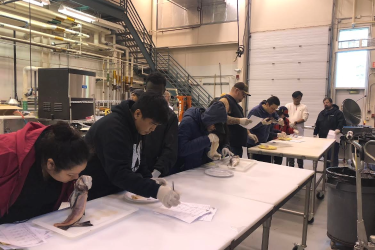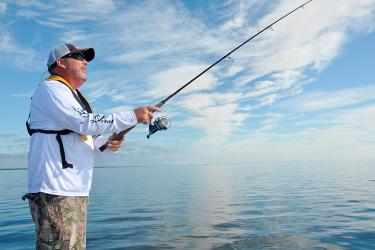A mother bottlenose dolphin and her calf were successfully relocated to open water in mid-June by the Louisiana Marine Mammal Stranding Network and partners in the Southeast Region Stranding Network. The mother and calf were trapped in a tidal pond system near Grand Isle, Louisiana, for over a year.
Coordinated by NOAA Fisheries, the rescue is just one example of an enhanced capacity to respond to marine mammal strandings in Louisiana. The work is supported by funds from the settlement with BP after the 2010 Deepwater Horizon oil spill.
The trapped animals were first reported in January 2022. The mother dolphin was identified as a Barataria Bay resident animal, although she had never been seen with a calf. The pair were presumed to have been trapped in the pond during a storm surge and flooding associated with Hurricane Ida in September 2021. Such strandings of marine mammals and sea turtles are common after large storms and flooding events, and returning the animals to their natural habitat requires rescue by trained responders.
Although the pond had ample food for the dolphins and appropriate water salinity, the mother and baby had no way of making their way back out to open water. The baby is believed to have been born just prior to or after the storm and was very small at the time of initial observation.
Because capture and handling during a rescue can be stressful and dangerous for dolphins, especially very young animals, the mother dolphin and calf were monitored every month by Audubon Nature Institute’s Coastal Wildlife Network to ensure they were safe and healthy, while allowing time for the calf to grow to a suitable age and size for rescue.
The pair was finally relocated this past June once the calf was determined to be old enough to be safely moved.
The rescue and relocation was organized by NOAA Fisheries' Marine Mammal Health and Stranding Response Program, and led by the National Marine Mammal Foundation, in coordination with the Louisiana Marine Mammal Stranding Coordinator, Lauren Noble, and Audubon Nature Institute’s Coastal Wildlife Network. SeaWorld Orlando, the Institute for Marine Mammal Studies, Dauphin Island Sea Lab, Mississippi State University, the South Carolina Aquarium, and the Grand Isle Police Department also participated in the effort.
Louisiana Enhanced Marine Mammal Stranding Network
Additional support and coordination for the stranding network in Louisiana improves the ability to report and respond to such strandings, care for stranded animals to improve survival rates, and collect valuable data to help improve conservation and restoration efforts for marine mammals. Samples collected from stranded animals can improve diagnosis of causes of illness and death in marine mammals in Louisiana, which will increase the understanding of natural and human-based threats to these animals in Louisiana waters.
The public is advised to report all stranded or out-of-habitat marine mammals and sea turtles (live or dead) to the Louisiana Stranding Hotline at (877) 942-5343.
When reporting strandings, the public should be prepared to give:
- Exact location and/or GPS coordinates.
- Photographs of the animal.
- Nature of the report (type of animal, live or dead, size, etc.).
Recommendations when reporting a live stranded animal include:
- Prioritize human safety. If conditions are dangerous, do not attempt to approach the animal.
- Never push an animal on shore back into the water, which could delay treatment and prolong suffering.
- Keep crowds away and noise levels down to avoid causing stress to the animal.
- If the animal returns to the water on its own, don't attempt to interact with it.
- Leave all entanglements (fishing line, ropes, etc.) that may be present on the animal.



